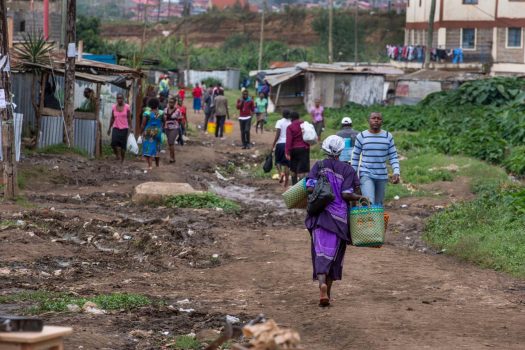As we reflect on how to commence this article and share reflections and musings on the COVID-19 situation and its impact on the reproductive health and rights of women and girls in Kenya, a particular statement sticks out – leaving no one behind. It sounds quite abstract unless you have been in a position where you ‘felt’ left behind or you were literally left behind. It is a term that human rights advocates and activists use quite often whilst promoting and protecting inclusivity in the human rights based approach.
Many women and girls in Africa have been left behind when it comes to accessing reproductive health services . This is partly due to stigma, lack of economic means, lack of information on where and how to access reproductive health services and products. The COVID-19 pandemic has made it worse as lockdowns, job losses and movement restrictions have led to difficulty in accessing reproductive health services. Many hospitals and health centers have given priority to COVID-19 and for those that still attend to reproductive health matters, extra measures have been put in place making previously short hospital visits take longer than usual which discourages many from going to hospitals.
Since the outbreak of the novel coronavirus, several reports both online and offline have highlighted stories of women, girls, women led households and the impact of Corona on a wide array of issues related to the wellness and wellbeing of those affected. Kenyans on social media in particular have been very effective in highlighting some of these cases as well as starting crowdfunding initiatives to support these women.
The Daily Nation, a Kenyan newspaper, highlighted the story of Nduku, a woman who lost her life due to lack of access to a health facility and maternity services to help her give birth to her seventh child. She died because bodaboda operators were afraid of police harassment – even though this was a medical emergency exempted from the curfew restrictions – they just did not know and were afraid. They resorted to traditional birth attendants who were unable to assist her. She had to wait till morning hours so she could finally access a health center. By then, the complications had progressed, she needed blood, there was none, by 2 p.m. her family was informed that she had passed on.
On 6th May, K24, one of Kenya’s television stations reported that a 27-year-old mother of two who was kicked out of her house in Mihango, Nairobi was gang raped by thugs in front of her children at an unfinished building where she took shelter. Her business of hawking fruits on Mombasa Road, had been hit hard by COVID-19 pandemic as customers dwindled and prices for stock spiked. This led to her being unable to pay her rent and she was kicked out of the house forcing her to seek shelter in the unfinished building.
The story of Wambui from Korogocho Grogon B Informal settlements, highlighted by activist Boniface Mwangi and the Kenya Human Rights Commission is worth mentioning. Her house barely without a roof, toilet and barely any house furniture one envisions when you visualise home. Like many women across the country, Wambui’s story is one that reminds us of the economic strain the corona virus has had on women. This economic strain has led many to prioritise feeding their families at the expense of their reproductive health needs.
These three stories show how the coronavirus pandemic has affected women’s lives. The stories demonstrate that the pandemic is undoubtedly a reproductive health complication and as such responses across the world including Kenya should be founded on protecting the Right to Health and as such Health related prevention and management means and structures the key tools for the response.
We laud the efforts of the various global and local organisations that have adapted their strategies to ensure women and girls in Kenya still have access to their reproductive needs. KELIN Kenya, CREAW and Katiba are jointly offering free legal services for gender based violence victims during COVID-19. Hotlines such as TICAH Kenya’s Aunty Jane Hotline and Reproductive Health Network’s Nena Na Binti can be accessed through phone calls. For those who prefer getting information online, platforms like safe2choose and FindMyMethod are a great resource.
The Right to Health is provided for under our Constitution in Article 43 (1) (a) that provides, every person has the right to the highest attainable standard of health, which includes the right to healthcare services, including reproductive health care. This provision asserts the inclusion of every person – man, woman, child. However, this is not the actual situation on the ground. The onus is on us as Individuals, Government and activists to ensure that the right to a decent life for women is achievable even during this pandemic. The reproductive health needs of women have not taken a break simply because there is a pandemic.

